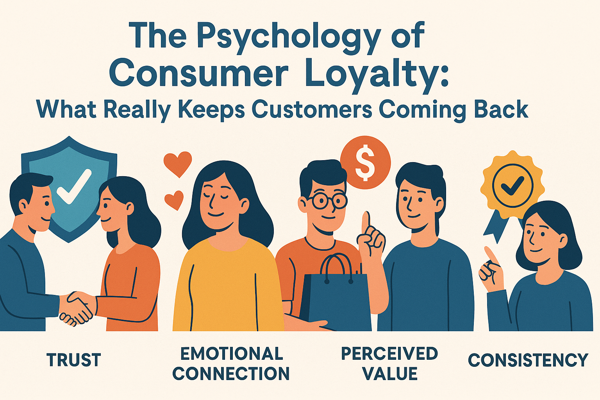In today’s crowded and competitive market, businesses often focus on getting new customers. But what really drives long-term success is keeping the ones they already have. Consumer loyalty isn’t just about repeat purchases — it’s a deeper emotional and psychological connection between a person and a brand. So what truly makes customers come back again and again?
What Is Consumer Loyalty?
Consumer loyalty refers to a customer’s consistent preference for a brand over time. It means choosing a particular product or service not just once, but regularly — even when there are many other options available. Loyalty can be:
- Behavioral: when people buy the same brand repeatedly.
- Emotional: when people feel connected to the brand and support it because of how it makes them feel.
True loyalty usually includes both — regular buying behavior and a strong emotional tie. Loyal customers don’t just return — they also recommend the brand to others and defend it when needed.
Why People Stay Loyal
There are several key psychological reasons that explain why customers stay loyal to a brand:
1. Trust
Trust is the foundation of any lasting relationship — including the one between a customer and a brand. When people believe a brand delivers what it promises, they feel confident buying from it again. Broken trust, however, can quickly ruin loyalty. That’s why clear communication, consistency, and reliability are so important.
2. Emotional Connection
People are more likely to support brands that make them feel good. Emotions such as happiness, nostalgia, comfort, or excitement can all be linked to a product or service. Brands that tap into these feelings — through stories, values, or customer experiences — often see higher levels of loyalty.
3. Feeling Valued
When customers feel recognized and appreciated, they’re more likely to stay loyal. Simple actions like personalized emails, birthday discounts, or remembering past purchases can make a big difference. Everyone likes to feel special — and when a brand makes that effort, it stands out.
4. Consistency
People value predictability. When a brand offers consistent quality, messaging, and experience, it builds trust and reliability. Whether it’s the design of a product or the tone of customer service, consistency helps customers feel secure in their choice.
5. Shared Values
Many customers stay loyal to brands that share their personal beliefs or support causes they care about. For example, if a company is known for protecting the environment, socially responsible customers may continue buying from them — even if the price is higher.
Creating Loyalty Through Strategy
Understanding the psychology is one thing — applying it is another. Here are some ways businesses can use psychological insights to encourage loyalty:
1. Loyalty Programs
Rewards programs are a classic method — and they work. When customers feel they’re getting extra value for their loyalty (like points, discounts, or exclusive access), they’re more likely to return. It also adds a “game-like” element that keeps them engaged.
2. Personalization
Personalized experiences show customers that a brand is paying attention. This could be product suggestions based on past behavior, or tailored messages and offers. The more relevant the interaction, the stronger the emotional bond becomes.
3. Community Building
Humans are social by nature. Brands that create a sense of community — through events, social media groups, or user content — help customers feel like they’re part of something bigger. That feeling of belonging can be a powerful loyalty driver.
4. Great Customer Service
Sometimes mistakes happen — but how a company handles them can build loyalty instead of breaking it. Fast, respectful, and helpful customer service creates trust. It shows customers that the brand cares about their experience.
The Power of Habit
Loyalty is often linked to habit. Once customers form a routine around a brand — ordering their favorite coffee every morning or always using a specific app — they’re less likely to switch. Brands can strengthen this habit through reminders, convenience, and smooth customer experiences.
Conclusion: Loyalty Is Earned, Not Bought
In the end, consumer loyalty isn’t just about giving discounts or sending emails. It’s about creating real, lasting relationships built on trust, value, and emotional connection. When people feel good about a brand, when they see their values reflected in it, and when they know they’re appreciated — that’s when loyalty truly forms.
For businesses, this means going beyond short-term tactics and focusing on the long game. Understand what matters to your customers. Speak their language. Deliver on your promises. And above all, make them feel seen and heard. That’s what keeps them coming back.

Leave a Reply